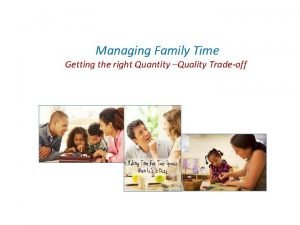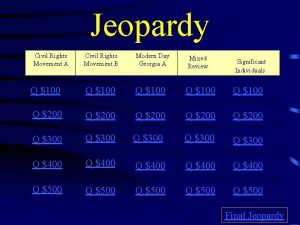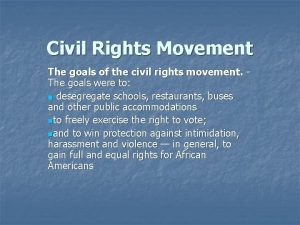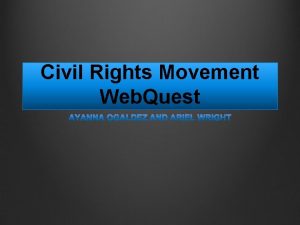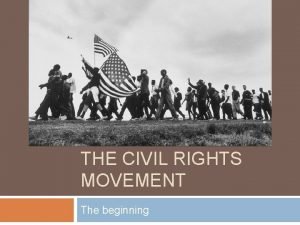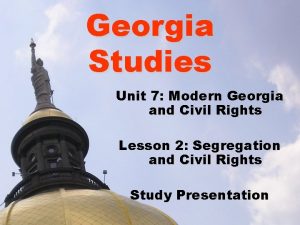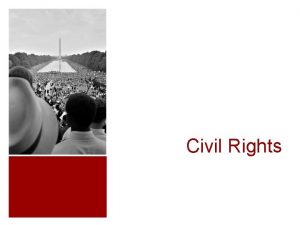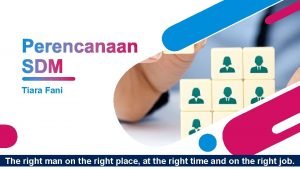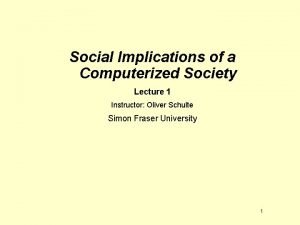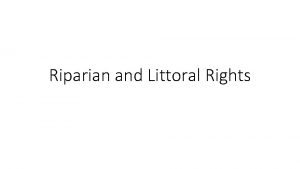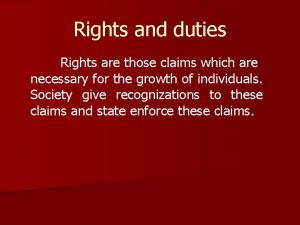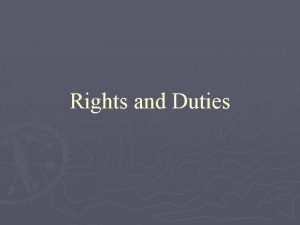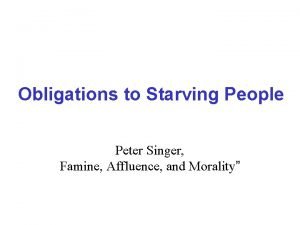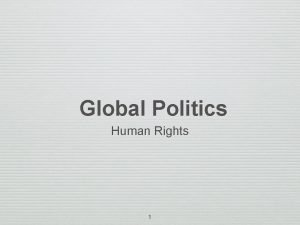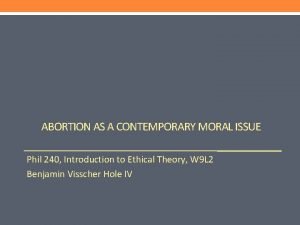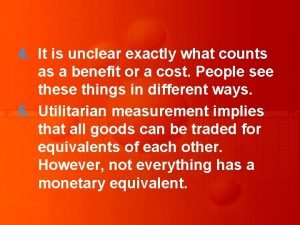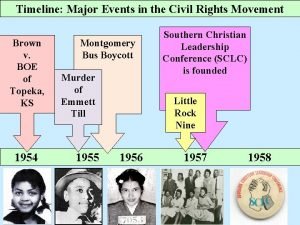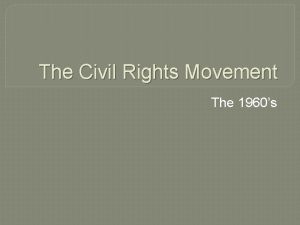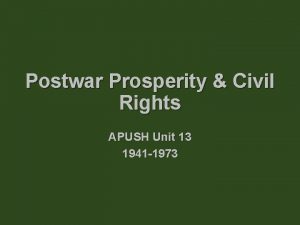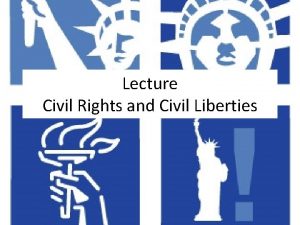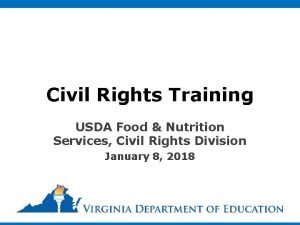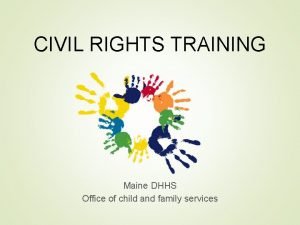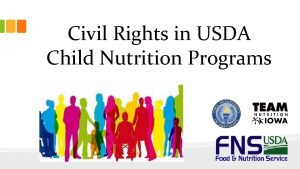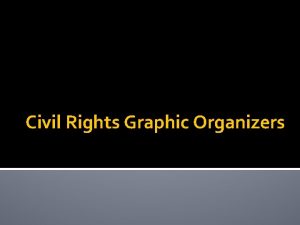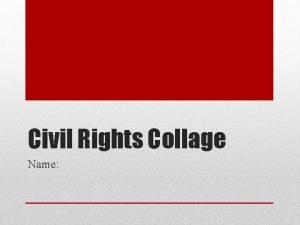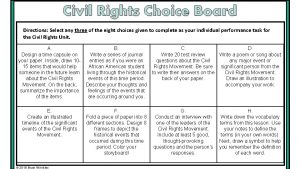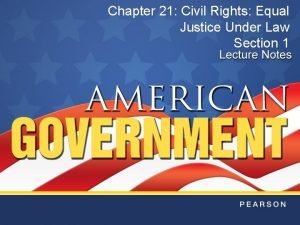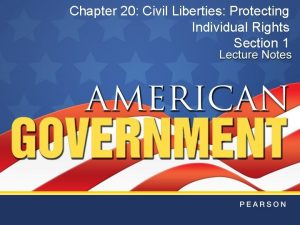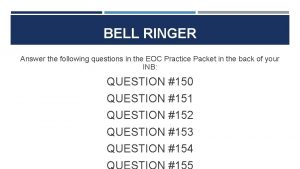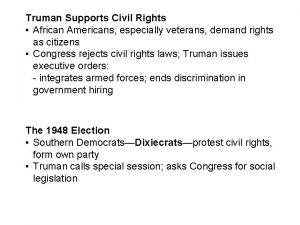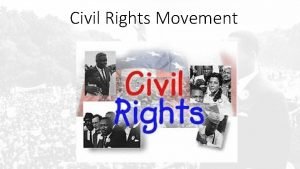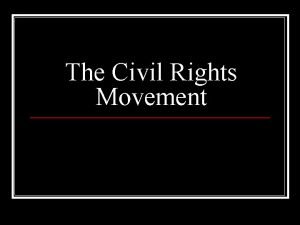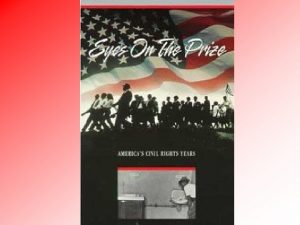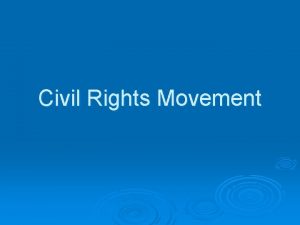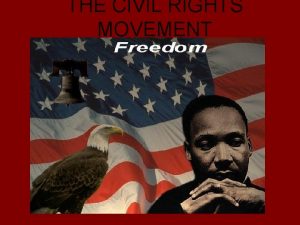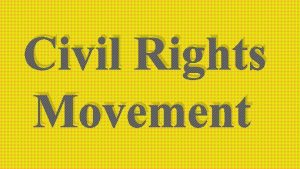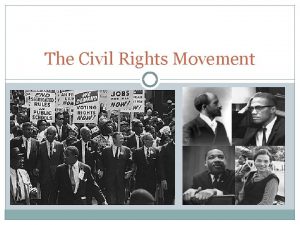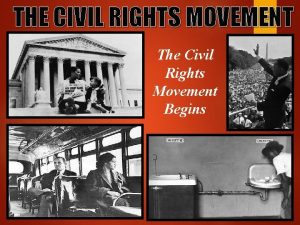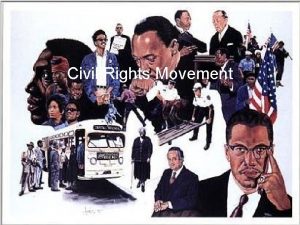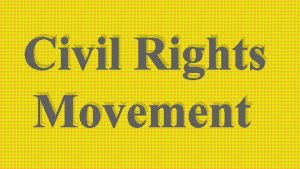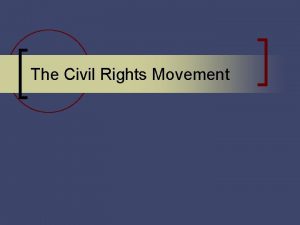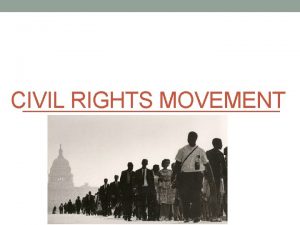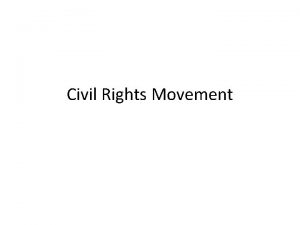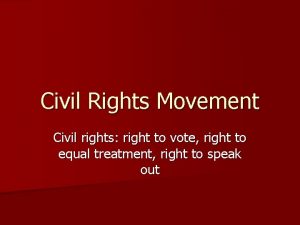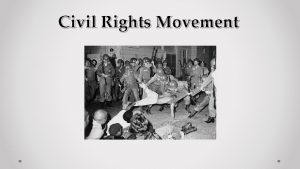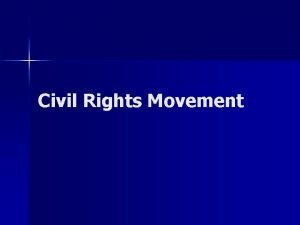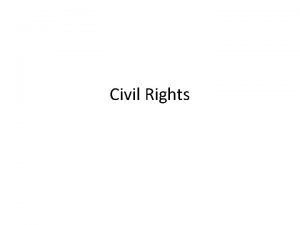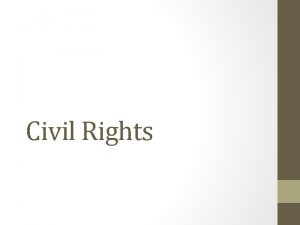Civil Right Movement Early vs Modern Civil Rights


































- Slides: 34


Civil Right Movement • Early vs. Modern Civil Rights Movement • Searching for an Identity and Leadership • Leaders, Activities, and Organizations

Civil Right Movement • Plessy v Ferguson – 1896 – “ 14 th amendment does not prevent private organization from discriminating” – Legalized Jim Crow Laws – Segregated accommodations were legal provided they were equal – “separate but equal”

Civil Right Movement • Booker T. Washington – Not for social equality – Remain apart – Founder of Tuskegee Institution in 1891 – Focus – industrial education/learn a skill – Vocational jobs to improve economic situation – Problem?

Civil Right Movement • W. E. B. Du Bois – Ph. D. from Harvard – Founder of the NAACP in 1910 • Grew out of the Niagara Movement – Never except inferiority – Use courts to fight discrimination – Rejected Washington’s ideas – “The Talented Tenth”

Civil Right Movement • Marcus Garvey – Black nationalist – United Negro Improvement Association in 1914 – Stressed racial separation from white – Black only businesses etc. – Encouraged a return to Africa

Civil Right Movement • In the 1950 s – 15 million African Americans living in the United States – 2/3 living in the south – Jim Crows laws ruled their lives – Legal segregation in schools, parks, transportation, hospitals etc

Civil Right Movement • Congress of Racial Equality (CORE) – Bring about change through peaceful measures – Founded by James Farmers in 1942 James Farmer 1920 -1999

Civil Right Movement • Brown v Board of Education of Topeka, Kansas – May 17, 1954 – Supreme Court unanimously decided segregation violates the 14 th amendment Brown Family

Civil Right Movement • Chief Justice Earl Warren • 1. Education plays a vital role in training children for citizenship, employment and leisure-time activities • 2. Separating black children from others solely on the basis of race “generates a feeling of inferiority that may affect them in a way unlikely to be undone” • 3. therefore, separate educational facilities are inherently unequal – Reversed Plessy v Ferguson – Thurgood Marshall argues the case

Civil Right Movement • Emmett Till – Killed in 1955 – Brings the problem to the attention of the nation

Civil Right Movement • Montgomery Bus Boycott 1955 -1956 – Rosa Parks “mother of the civil rights movement” refused to leave seat for a white man – Arrested for violating the city’s segregation law – Year long boycott of the bus company – Calls by pastors of church to lead resistance – City agreed to change the law to allow black to sit anywhere – Event produced a leader, an organization, technique • Martin Luther King Jr. • SCLC • Non- violent civil disobedience


Civil Right Movement • Integration at Little Rock 1957 – Orval Faubus, gov. of Arkansas, mobilized the National Guard to prevent nine African-Americans students from attending – Direct challenge to federal authority – Eisenhower sent in army (paratroopers) to restore order and protect the “Little Rock Nine”


Civil Right Movement • Woolworth lunch counter in Greensboro, North Carolina – Greensboro four – Feb. 1 st Bought items at Woolworth than sat down to order coffee – Not served – Result • July desegregated lunch counters • Over 70, 000 people participated in sit-in through out the South • Press they received


Civil Right Movement • Student Nonviolent Coordination Committee (SNCC) – – Grew out of SCLC For students Leaders was Robert Moses was organized to advance the "sit-in" movement

Civil Right Movement • Freedom Rides – Spring of 1961 – SNCC members joined with activists from the Congress of Racial Equality (CORE), a New York -based civil rights organization to encourage the Freedom Rides – Placed white and black students on interstate busses to test the new court decision to desegregate waiting rooms and dining facilities at bus stops – In deep South response was violent – Attorney General Robert Kennedy assigned federal marshals to protect riders


Civil Right Movement • Integration of “Ole Miss” – 29 yr old veteran James Meredith – Arrival touched off riots • Mostly KKK members NOT students • Gov Ross Barnett refused to allow to register • Announced state laws were superior to federal laws – Pres. Kennedy federalized Miss. National Guard – Took 400 Marshals and 3000 troops to enroll him – Meredith remained and graduated in 1963 – Cost 200 lives and 4 million in taxpayer’s $


Civil Right Movement • University of Alabama – – Vivian Malone Gov George Wallace stood in doorway National Guard was federalized Wallace walked away


Civil Right Movement • Birmingham, Alabama – Rev. Shuttlesworth asked MLK to come to city – Most segregated big city in America – Test nonviolence – It was a planned non-violent campaign – Police Commissioner “Bull” Connor decided to crush the protest – Police used fire hoses, police dogs and clubs – TV carried scene to the nation

Civil Right Movement • MLK arrested – Leaders felt MLK was pushing too hard/too fast – Response “Letters from Birmingham” – Kids march, 1000 arrested – Result • End to segregation in Birmingham • HUGE victory • Kennedy on TV asked Congress to pass a Civil Rights Bill • Nation saw racism in the South at its worst

Civil Right Movement • March on Washington (Aug 1963) – To support and pressure Kennedy – 250, 00 African Americans marched on nation’s capital – “I have a Dream”

Civil Right Movement • Civil Rights Act – Three months later Kennedy was assassinated – Bill wasn’t close to passing • Southern Congressmen had a filibuster going – Johnson addressed Congress • “…couldn’t more eloquently honor Pres. Kennedy’s memory” – Passed in June 1964

Civil Right Movement • Civil Rights Act of 1964 – Elections: • Prohibited election officials from applying different standards to blacks and whites voting – Public Accommodations: • Forbade discrimination in public places • Forbade discrimination in government owned or operated facilities – Federally Assisted Programs • Allowed the government to withhold aid from states involving discrimination – Employment • Prohibited discriminatory practices by employers, agencies, and labor union • No discriminatory hiring on basis of race, sex , religion or nationality


Civil Right Movement • 24 th Amendment – Passed in 1964 – Prohibited the use of poll taxes as a requirement for voting in a federal election

Civil Right Movement • Voting Act of 1965 – A result of Selma, Alabama incident – State troops assaulted demonstrators as they marched to the state capital – President Johnson “We shall over come” – Outlawed literacy test – Federal examiners in to register voters where irregularities existed – Signed 100 years after the Civil War ended

Civil Right Movement • Results of Civil Rights – Right to vote • South would never be the same again • Served in politics at all level – Segregation became illegal – Ended an Era • Civil Rights campaigns in the South led by peaceful moderates • Lets go North!

"Darkness cannot drive out darkness; only light can do that. Hate cannot drive out hate; only love can do that. Hate multiplies hate, violence multiplies violence and toughness multiplies toughness in a descending spiral of destruction. The chain reaction of evil………must be broken, or we shall be plunged into the dark abyss of annihilation. " » Martin Luther King Jr.
 Rosa parks mother
Rosa parks mother Right product right place right time right price
Right product right place right time right price Family time
Family time Civil rights webquest
Civil rights webquest Civil rights movement jeopardy
Civil rights movement jeopardy Civil rights movement goal
Civil rights movement goal Civil rights movement vocabulary
Civil rights movement vocabulary Civil rights movement webquest
Civil rights movement webquest The civil rights movement
The civil rights movement Civil rights movement essential questions
Civil rights movement essential questions Unit 7: modern ga and civil rights
Unit 7: modern ga and civil rights Civil right def
Civil right def The right man on the right place at the right time
The right man on the right place at the right time Positive vs negative rights
Positive vs negative rights Littoral real estate
Littoral real estate Conclusion of rights
Conclusion of rights Legal rights vs moral rights
Legal rights vs moral rights Positive and negative rights
Positive and negative rights Positive vs negative rights
Positive vs negative rights Negative rights vs positive rights
Negative rights vs positive rights Positive rights and negative rights
Positive rights and negative rights Civil rights timeline of events
Civil rights timeline of events Civil rights sitins
Civil rights sitins Chapter 14 postwar prosperity and civil rights
Chapter 14 postwar prosperity and civil rights Right to die
Right to die Usda civil rights training
Usda civil rights training Civil rights training child nutrition programs
Civil rights training child nutrition programs Civil rights in child nutrition programs
Civil rights in child nutrition programs Civil rights graphic organizer
Civil rights graphic organizer Civil rights collage
Civil rights collage Civil rights choice board
Civil rights choice board Chapter 21 civil rights equal justice under law
Chapter 21 civil rights equal justice under law Chapter 20 civil liberties protecting individual rights
Chapter 20 civil liberties protecting individual rights Civil rights bell ringers
Civil rights bell ringers Truman supports civil rights
Truman supports civil rights


